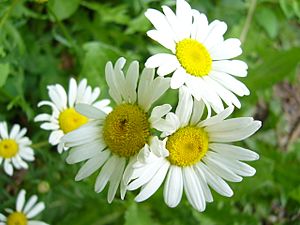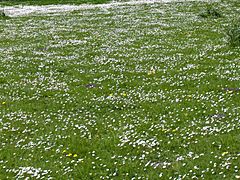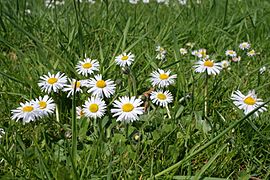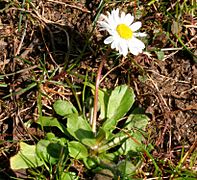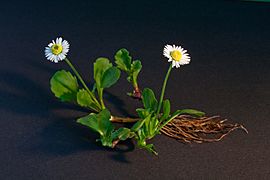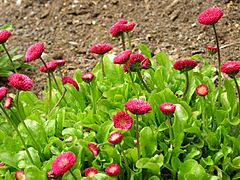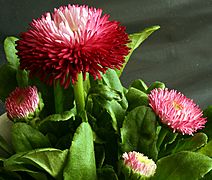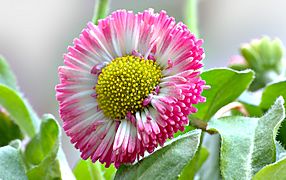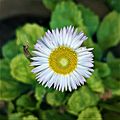Bellis perennis facts for kids
Bellis perennis is a very common type of daisy found in Europe. It belongs to the Asteraceae family, which is a large group of flowering plants. Many people think of this plant when they hear the word "daisy."
Because many other plants are also called "daisy," this specific plant is sometimes called the common daisy, lawn daisy, or English daisy. It looks a bit like another plant in the same family called Leucanthemum vulgare. The common daisy is originally from western, central, and northern Europe. However, it has spread and now grows naturally in many temperate parts of the world, including the Americas and Australasia.
Quick facts for kids Bellis perennis |
|
|---|---|
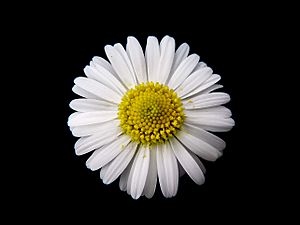 |
|
| Scientific classification |
|
| Kingdom: | Plantae |
| Clade: | Tracheophytes |
| Clade: | Angiosperms |
| Clade: | Eudicots |
| Clade: | Asterids |
| Order: | Asterales |
| Family: | Asteraceae |
| Genus: | Bellis |
| Species: |
B. perennis
|
| Binomial name | |
| Bellis perennis |
|
| Script error: The function "autoWithCaption" does not exist. | |
| Synonyms | |
|
|
Script error: No such module "Check for conflicting parameters".
Contents
What's in a Daisy's Name?
The famous scientist Carl Linnaeus gave the common daisy its scientific name, Bellis perennis, in 1753.
- The word Bellis comes from Latin. It means "pretty" or "beautiful." An ancient writer named Pliny the Elder even wrote about how beautiful daisies are in meadows.
- The word perennis also comes from Latin. It means "that lasts the whole year" or "perennial." This is because the plant lives for more than two years.
How to Identify a Common Daisy
The common daisy is a small, low-growing plant. It has short underground stems called rhizomes. Its leaves are small, rounded, or spoon-shaped, usually about 2 to 5 centimeters (1 to 2 inches) long. These leaves grow flat against the ground.
The "flower" of a daisy is actually made of many tiny flowers grouped together. This is called a flower head. Each flower head is about 2 to 3 centimeters (1 inch) across. What looks like white petals are actually individual flowers called ray flowers. In the yellow center, there are many tiny yellow flowers called disk flowers. Both types of flowers work together to attract insects. These flower heads grow on stems that don't have leaves, and they can be 2 to 10 centimeters (1 to 4 inches) tall.
Where Do Daisies Grow?
Bellis perennis is originally from Northern Africa (like Morocco), Southwestern Asia, and Europe. However, it has been widely introduced and now grows naturally in many other places around the world.
Daisies often grow in grasslands, including lawns. Once they start growing, they can be quite hard to remove. Because they spread easily, some people consider them a type of invasive weed.
Can You Eat Daisies?
Yes, you can actually eat parts of the common daisy!
- The young leaves can be eaten raw in salads or cooked. Just know that older leaves can taste a bit bitter.
- The flower buds and petals can also be eaten raw. You can add them to sandwiches, soups, and salads.
- Some people even use daisies to make tea or as a vitamin supplement.
Daisy Pictures
-
Bellis perennis in a meadow.
More Daisy Images
-
Well-trodden meadow at London's Kew Gardens, the grass white with daisies
See also
 In Spanish: Margarita (planta) para niños
In Spanish: Margarita (planta) para niños
 | George Robert Carruthers |
 | Patricia Bath |
 | Jan Ernst Matzeliger |
 | Alexander Miles |


